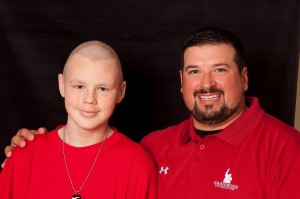 Too often, we don’t think about cancer until it’s happening to us or someone we love. We don’t focus on the healthy choices we can make along the way to help prevent the disease. (And I say “help” because we all know there is no magic bullet, sadly.)
Too often, we don’t think about cancer until it’s happening to us or someone we love. We don’t focus on the healthy choices we can make along the way to help prevent the disease. (And I say “help” because we all know there is no magic bullet, sadly.)
But doctors do believe there are actions we can take to better our odds. And, of course, all of those measures have significant holistic benefits, cancer-prevention aside!
So in honor of National Cancer Prevention Month, we at the Foundation would like to share a few of our favorite health tips, from expert sources ranging from the Mayo Clinic to the American Cancer Society.
No smoking! Avoiding tobacco — and second-hand smoke – is one of the most important health decisions you can make. We all know smoking and chewing tobacco has been linked to many types of cancer – lung, bladder, cervix, kidney and pancreas, among others.
Eat healthy. Nothing guarantees cancer prevention, but a leaner, low-fat diet full of fruits, vegetables, whole grains and beans can only help your overall health. Limit or cut back on red meat and salty, processed foods. And if you choose to drink alcohol, remember – moderation!
Exercise for 30 minutes every day. This will help you maintain a healthy weight, lowering your risk for breast, prostate, lung, colon and kidney cancer. Find something fun that gets you moving. Make your health a priority, even when you’re busy.
Don’t just watch the scale. Measure your waist to approximate abdominal fat. For women, shoot for a waist of 31.5 inches or less and for men, 37 inches or less.
Restrict those rays. Skin cancer is one of the most common and preventable kinds of cancer. To protect yourself, avoid midday sun, stay in the shade, wear sunglasses, hats and sunscreen and definitely avoid tanning beds and sun lamps. (For the ladies, self-tanning lotions and bronzers have come a long way!)
Immunize yourself. Managing viral infections is important. Ask your doctor about the Hepatitis B and Human papillomavirus (HPV) vaccines, which help protect sexually-active, non-monogamous adults and those with high-risk jobs, such as health care workers.
Do detection. Regular self-exams and professional screening for various cancers can increase your chances of early detection and successful treatment.
Don’t forget that cancer survivors and those undergoing treatment should also follow prevention recommendations. All of these actions contribute to better overall health and a better chance of recovering and remaining cancer-free.
We all know that, despite our best efforts, anyone can get cancer. When Joe was diagnosed, our family certainly witnessed the shock of experiencing how cancer can attack even the young and healthy – even a professional athlete in the prime of his physical life. This disease does not make sense yet, and that can be hard to accept. That’s why we’re urging everyone we know to do everything they can this month – and all year – to fight cancer. Take care of yourselves and commit to adding some healthy habits… even if it’s just one at a time.
For our part, we’ll continue to focus on prevention through funding cancer research and providing our families with resources and information, as well as emotional, moral and financial support. Because we know that reducing stress, increasing happiness and strengthening our social connections – sometimes considered intangible factors in the big picture of our health – help too. And we believe cancer deserves a good fight on all fronts!
— Jen Andruzzi

